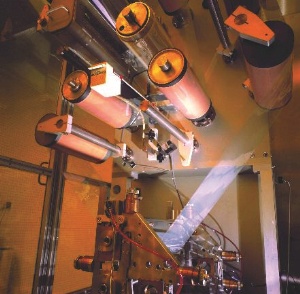
Epigem’s Epimesh film will used for flexible OLED development
Redcar-based firm Epigem has secured €444,000 (GBP 379,355) from the EU to help deliver flexible organic light-emitting diodes (OLEDs) to market.
The company is a member of an international consortium of businesses, that has committed €11.2m (9.56 million) including EU funding to the Flex-o-Fab project to bring the new lighting technology to market within six years.
Epigem’s role is to produce anode film based on its existing Epimesh product. Its Epimesh film has been developed as a flexible electrode with very low sheet resistance combined with high-optical transparency.
The first OLED products, rigid glass tiles, are already on the market. However, OLEDs can be produced on plastic films/ foils to create flexible light sources. The company says flexible OLEDs would be more robust and even lower cost to produce than glass-based OLEDs and could be embedded into all kinds of everyday objects.
Epimesh film comprises an ultra-fine metal mesh embedded into a polymer coating which is adhesively bonded onto one side of a flexible carrier film. Light transmission through the metal grid and polymer layers is typically above 90 per cent.
Flexible OLEDs have been tested in the laboratory and now the Flex-o-Fab project aims to develop reliable processes for manufacturing OLEDs on plastic foils. To do this, the project will create a pilot-scale manufacturing chain for flexible OLEDs and use it to develop reliable production processes.
The funding from the EU’s 7th framework programme, is expected to strengthen Europe’s position in the lighting industry by making flexible OLEDs a commercial reality.
Tim Ryan, managing director of Epigem, said: “This is a fantastic opportunity to work with other leading technology companies and show what can be achieved by combining Europe-wide expertise, skills and experience.”
The project will draw on technologies already used to produce glass-based OLEDs and flexible displays and will look to migrate existing sheet-to-sheet processes to roll-to-roll production to further reduce costs and enable high-volume production.
Flex-o-Fab’s project manager, Flora Li of the Netherlands’ Holst Centre said: “This is an industry-led project that brings together companies and institutes with strong backgrounds in organic electronics from across Europe. They are all leaders in their respective fields whose knowledge and expertise complements each other perfectly and we are keen to hear from other potential partners who can add to the mix.”
The Flex-o-Fab consortium is made up of 12 organisations including Philips Research in the Netherlands and Germany and Henkel Electronics Materials in Belgium.





